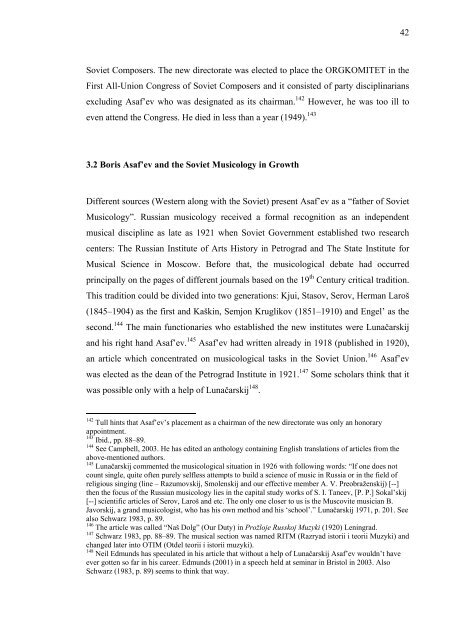Boris Asaf'ev and the Soviet Musicology - E-thesis
Boris Asaf'ev and the Soviet Musicology - E-thesis
Boris Asaf'ev and the Soviet Musicology - E-thesis
Create successful ePaper yourself
Turn your PDF publications into a flip-book with our unique Google optimized e-Paper software.
<strong>Soviet</strong> Composers. The new directorate was elected to place <strong>the</strong> ORGKOMITET in <strong>the</strong><br />
First All-Union Congress of <strong>Soviet</strong> Composers <strong>and</strong> it consisted of party disciplinarians<br />
excluding Asaf’ev who was designated as its chairman. 142 However, he was too ill to<br />
even attend <strong>the</strong> Congress. He died in less than a year (1949). 143<br />
3.2 <strong>Boris</strong> Asaf’ev <strong>and</strong> <strong>the</strong> <strong>Soviet</strong> <strong>Musicology</strong> in Growth<br />
Different sources (Western along with <strong>the</strong> <strong>Soviet</strong>) present Asaf’ev as a “fa<strong>the</strong>r of <strong>Soviet</strong><br />
<strong>Musicology</strong>”. Russian musicology received a formal recognition as an independent<br />
musical discipline as late as 1921 when <strong>Soviet</strong> Government established two research<br />
centers: The Russian Institute of Arts History in Petrograd <strong>and</strong> The State Institute for<br />
Musical Science in Moscow. Before that, <strong>the</strong> musicological debate had occurred<br />
principally on <strong>the</strong> pages of different journals based on <strong>the</strong> 19 th Century critical tradition.<br />
This tradition could be divided into two generations: Kjui, Stasov, Serov, Herman Laroš<br />
(1845–1904) as <strong>the</strong> first <strong>and</strong> Kaškin, Semjon Kruglikov (1851–1910) <strong>and</strong> Engel’ as <strong>the</strong><br />
second. 144 The main functionaries who established <strong>the</strong> new institutes were Lunačarskij<br />
<strong>and</strong> his right h<strong>and</strong> Asaf’ev. 145 Asaf’ev had written already in 1918 (published in 1920),<br />
an article which concentrated on musicological tasks in <strong>the</strong> <strong>Soviet</strong> Union. 146 Asaf’ev<br />
was elected as <strong>the</strong> dean of <strong>the</strong> Petrograd Institute in 1921. 147 Some scholars think that it<br />
was possible only with a help of Lunačarskij 148 .<br />
142<br />
Tull hints that Asaf’ev’s placement as a chairman of <strong>the</strong> new directorate was only an honorary<br />
appointment.<br />
143<br />
Ibid., pp. 88–89.<br />
144<br />
See Campbell, 2003. He has edited an anthology containing English translations of articles from <strong>the</strong><br />
above-mentioned authors.<br />
145<br />
Lunačarskij commented <strong>the</strong> musicological situation in 1926 with following words: “If one does not<br />
count single, quite often purely selfless attempts to build a science of music in Russia or in <strong>the</strong> field of<br />
religious singing (line – Razumovskij, Smolenskij <strong>and</strong> our effective member A. V. Preobraženskij) [--]<br />
<strong>the</strong>n <strong>the</strong> focus of <strong>the</strong> Russian musicology lies in <strong>the</strong> capital study works of S. I. Taneev, [P. P.] Sokal’skij<br />
[--] scientific articles of Serov, Laroš <strong>and</strong> etc. The only one closer to us is <strong>the</strong> Muscovite musician B.<br />
Javorskij, a gr<strong>and</strong> musicologist, who has his own method <strong>and</strong> his ‘school’.” Lunačarskij 1971, p. 201. See<br />
also Schwarz 1983, p. 89.<br />
146<br />
The article was called “Naš Dolg” (Our Duty) in Prožloje Russkoj Muzyki (1920) Leningrad.<br />
147<br />
Schwarz 1983, pp. 88–89. The musical section was named RITM (Razryad istorii i teorii Muzyki) <strong>and</strong><br />
changed later into OTIM (Otdel teorii i istorii muzyki).<br />
148<br />
Neil Edmunds has speculated in his article that without a help of Lunačarskij Asaf’ev wouldn’t have<br />
ever gotten so far in his career. Edmunds (2001) in a speech held at seminar in Bristol in 2003. Also<br />
Schwarz (1983, p. 89) seems to think that way.<br />
42

















